We are proud to highlight the accomplishments of our inspiring graduates. Through their hard work and devotion to scholarship, they have forged a path to success in many different fields. Find out where a Hartford Seminary degree can lead you.
Dr. Nisa Muhammad ’17 Works Around the Pandemic Clock
Like many of us, Dr. Nisa Muhammad ‘17 finds herself on Zoom calls at all hours. As Assistant 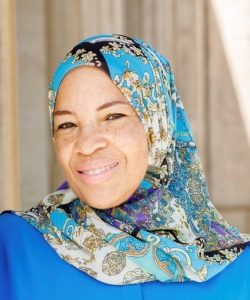 Dean of Religious Life in the Office of the Dean of the Chapel at Howard University, she is adapting to life during a pandemic with all the energy she brings to everything she does.
Dean of Religious Life in the Office of the Dean of the Chapel at Howard University, she is adapting to life during a pandemic with all the energy she brings to everything she does.
“We have Zoom calls at all hours to meet the needs of students,” she said. “I’ve met with [overseas] students after fajr [prayer] at 6 a.m., when it is afternoon their time. We have virtual study hall, and we started a social justice tutoring program for the children of faculty and staff who are teleworking using work study students who otherwise would not have jobs since we are not on campus.”
Dr. Muhammad works closely with Muslim students by helping them strengthen and affirm their faith in challenging circumstances. She also organizes Muslim worship and devotion services, providing pastoral care to students and faculty, and responds to many different questions and challenges from race to religion to relationships.
It won’t surprise anyone who knows her that Dr. Muhammad is also the advisor to student groups ranging from the Interfaith Collegiate Corps to the Juvenile Justice Advocates to the Muslim Students Association, even to the Chess Club.
“My door is open to all students who find their way to my chair with questions, concerns as well as comments about life, love, and the pursuit of happiness at the Mecca, as Howard University is known.” Read more
Chaplain Asma Inge-Hanif Honored
When it comes to volunteering, Hartford Seminary graduate Chaplain Asma Inge-Hanif is one of 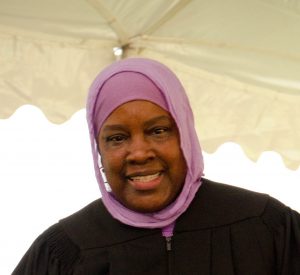 the best.
the best.
In 2018 alone, she has been recognized with two awards: the Martin Luther King Jr. Drum Major Innovation Service Award and the National Homeless Council’s Founding Mother, “Karen Rotondo Award for Outstanding Service,” the only Muslim ever to receive that award.
The MLK Jr. Drum Major Innovation Service award is awarded to volunteers who perform extraordinary every-day acts of service. The focus is to recognize extraordinary volunteers.
The “Karen Rotondo” award recognizes “clinicians who provide culturally appropriate, high-quality hands-on care to people experiencing homelessness.”
Asma has also been awarded with honors such as: Baltimore Orioles Birdland Hero, Black History Month Community Leaders Award, Nurse GEM Regional Award for Volunteerism and Service, and the Dunkin’ Donuts Community Hero Award.
Being an extraordinary volunteer is nothing new to Asma. “My original degrees were as a nurse and a nurse practitioner. How I became involved in doing this work was I discovered that there was a large number of Muslim women that were victims of domestic violence. So, I wanted to be able to make a difference.” Eventually, that led her to establish a shelter, Muslimat Al-Nisaa, for Muslim women and their children. She also works with refugees, trafficking victims and the homeless.
Her journey wasn’t without hardship. Asma was told by her community that she wasn’t taken seriously, although she had been doing her work for 30 years. She couldn’t get financial support for her shelters or foundations and eventually found herself at a meeting at Fairfax Institute, where a professor was representing Hartford Seminary — in particular the Imam and Muslim Community Leadership program.
At first, Asma thought the program was only for men.
“I’ll never forget the professor leading the discussion said that any qualified individual could apply, so I did.”
Eventually, she also completed the Islamic Chaplaincy Program at Hartford Seminary. Studying at the Seminary gave Asma the knowledge and training she craved.
One concept she enjoyed learning about was “holy envy.”
“You are allowing yourself to sit in the company of other faith traditions and tell them something about your faith that you think is wonderful,” she said. “As opposed to tearing things down.”
Sadly, Asma’s mother passed away during her time at the Seminary, but she says she’s glad she was surrounded by people who didn’t hesitate to show how much they cared for her.
“When I didn’t have the money to even bury my mother and when people in the class heard about it — I wanted to put in those two little markers — people there gave money. Muslim, Christians, Jews; everyone in that class came together and they helped. It was a wonderful experience, and people need to know go attend Hartford Seminary.”
The Rev. Dr. Stephen Ray, BMP Alum and Hartsem Lecturer, Named President of Chicago Theological Seminary
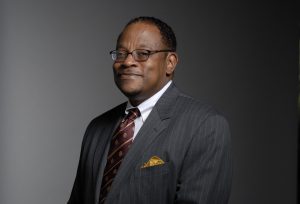
Rev. Dr. Stephen G. Ray, Jr., President, Chicago Theological Seminary (PRNewsfoto/Chicago Theological Seminary)
The Rev. Dr. Stephen Ray, who graduated with the first class of the Black Ministries Program in the early 1980s, has been appointed as the next President of Chicago Theological Seminary.
“I want to offer my profound thanks to the Hartford Seminary, without whom this wonderful career I have experienced may have been very different,” he said in an email about his new position.
Chicago Theological Seminary’s announcement of the appointment follows:
CHICAGO, January 24, 2018 – Chicago Theological Seminary (CTS) today named Rev. Dr. Stephen G. Ray Jr., as its new president, succeeding Rev. Dr. Alice Hunt, who announced her retirement last February. Ray will become the 13th president in the seminary’s 164-year history on February 1, 2018.
“Dr. Ray brings an incredibly deep understanding of the changing cultural and religious landscape facing theological education. His 30 plus years of experience equip him not only to see the challenges, but to identify and articulate the possibilities ahead,” said Norman J. Williams, chair of the Seminary’s board of trustees. “I am convinced that his clear strategic vision will lead to new opportunities for CTS. We are excited to expand the seminary’s capabilities and build on Dr. Hunt’s contributions.”
A renowned theological scholar, Ray is no stranger to CTS, having served as visiting professor in 2013. His appointment has been met with enthusiasm across the seminary world and by theological leaders and the United Church of Christ (UCC) where Ray is an ordained minister.
“Having worked closely with Dr. Ray, I am thrilled to learn that Chicago Theological Seminary has called him as their next president,” said Rev. John C. Dorhauer, UCC general minister and president.
“He brings a solid foundation of theological sophistication and a deep awareness of emerging racial, political, and cultural realities. He knows where theological intersections with culture and politics matter—long a hallmark of the kind of leader CTS has cultivated throughout its history,” noted Dorhauer. “He will make the alumni proud while inspiring a whole new generation of visionary and prophetic leaders too often in short supply these days.”
Dr. Ray thanked the Seminary’s search committee and board of trustees, and promised to devote his passion and voice to serving its mission and constituents.
“It’s a tremendous honor to be selected to head the prestigious Chicago Theological Seminary. I look forward to working with the board, talented faculty, staff, students, and alumni/ae to further our critical mission of preparing Leaders for the Next. We are committed to developing citizens of the future who unabashedly, and unashamedly champion justice, mercy, and the inherent value of every human being,” said Dr. Ray.
“Alice Hunt moved CTS forward with her commitment to innovation. Her inspirational leadership led the Seminary to think differently and execute new models,” continued Dr. Ray. “Theological education is at a critical juncture, amid downward trends in enrollment, and unconscionable burdens put upon those taking on student debt. Yet, I am certain that we have the tools necessary to confront these challenges and seize the opportunities facing theological education, its institutions, and the students we serve, to make our religiously plural world wiser, more merciful and just than ever before.”
Prior to being called to lead CTS, Ray served as the Neal F. and Ila A. Fisher Professor of Systematic Theology at Garrett-Evangelical Theological Seminary, related to the United Methodist Church and located on the campus of Northwestern University in Evanston, Illinois.
Well known for his articles on Christology, race, and the Black experience, Ray is also author of Do No Harm: Social Sin and Christian Responsibility, a contributor to Constructive Theology: A Contemporary Approach to Classical Themes, and co-author of Black Church Studies: An Introduction. He is president of the Society for the Study of Black Religion; past co-chair of the Workgroup on Constructive Theology; and served on the executive committee of the Black Religious Scholars Group. Ray serves on the review boards of Conversations in Religion and Theology and Westminster/John Knox Press; and is member of the American Academy of Religion.
Ray has received numerous awards, including Yale Divinity School’s Hooker Fellowship for Excellence in Theological Studies; Yale University’s University Fellowship; Charter Oak State College’s Distinguished Alumni Award; and was named to Morehouse College’s Martin Luther King, Jr. International Collegium of Scholars in 2008.
Ray’s past positions include associate professor of African-American studies and director of the Urban Theological Institute at Lutheran Theological Seminary at Philadelphia; associate professor of theology and philosophy at Louisville Presbyterian Theological Seminary; and lecturer at Yale Divinity School and Hartford Seminary. He received a doctor of philosophy in theology and African-American studies from Yale University and a master of divinity (summa cum laude) from Yale Divinity School.
Dema Kazkaz Is First Female President of Iowa Mosque
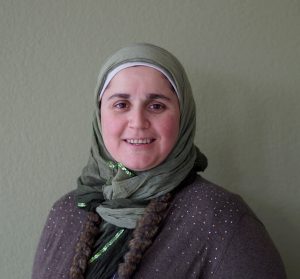 After graduating from Hartford Seminary in 2016 with an M.A. in Religious Studies focusing on Christian-Muslim Relations, Dema Kazkaz has become the first female President of Masjid Al-Noor Islamic Center in Waterloo, Iowa.
After graduating from Hartford Seminary in 2016 with an M.A. in Religious Studies focusing on Christian-Muslim Relations, Dema Kazkaz has become the first female President of Masjid Al-Noor Islamic Center in Waterloo, Iowa.
The path she has chosen is groundbreaking and inspiring, but Dema was hesitant to take it at first.
“I was struggling to find my own way. Someone who always helped me was [former Hartford Seminary faculty member] Dr. Ingrid Mattson. I would call her all the time and consult with her on what to do and we would find different strategies. She used to be my advisor at Hartford Seminary, then we kept that relationship when she moved to Canada.”
Dema says she would go to Dr. Mattson for things like consultation, advising, counseling and how to overcome the fact that the mosque’s leaders were predominantly men. Despite being one of the few women to lead a mosque, Dema doesn’t consider herself to be doing anything out of the norm. She sees her role, and the need to educate people about interfaith dialogue, as a natural progression.
“What I’m doing is claiming my position back, my Islamic right. I’m doing what I feel needs to be done here in this community. Trying to improve it and push it to progress toward having an open mind towards ‘the other.’ Challenge them once in a while to do something we’ve never done before.”
One of the first initiatives Dema worked on was a ‘know-your-neighbor’ group with about five or six local Christian women. “All of the time we are the minority and we are less in numbers. So we’ve had this relationship for probably six to eight years now.”
The women study together and sometimes go to lunch or dinner. The group was originally founded when a local Christian woman came to the Islamic center wanting to build bridges. Dema recalls thinking, “Here we go, I joined this school [Hartford Seminary] – let me use these tools. Would you like to establish something like this? A few of your group and a few of my group believe in interfaith so we can meet.”
Another Christian woman heard about the interfaith work Dema was doing, and an even bigger program came out of that. “So between our Mosque and their church, St. John’s Lutheran Church, we started with probably 10 women and right now we are up to 50. We have probably five more churches and a synagogue.”
They rotate who will host the meeting and every time it’s something different. “Last month we went to the Sons of Jacob Synagogue and watched a documentary about them because they are almost over a hundred years old in the community. That was a ‘wow’ moment for all of our members because most of them didn’t know we had a Jewish community.”
Dema has also just finished the first of four lectures about women and religion. “It was me, Erin Maden [the leader of the Sons of Jacob Synagogue], and Ruth Ratliff from the Episcopalian church. We are representing women from different perspectives of each faith. It was open to the adults and the public as well as students, and about 60 people attended. They were so happy, it’s amazing when you see that feedback.”
A local private college has reached out to express interest in holding the lectures in their community as well as two other universities.
Dema is also working on getting the youth in her community trained to speak in public. “There is so much high demand on us to speak and present our faith because there are so many misconceptions, and if we don’t step forward and clear these misconceptions, nobody will. In the same way Hartford Seminary equipped me, I have to equip others and keep the ball rolling.”
Dema says that Hartford Seminary helped humanize “the other” in her eyes. “For example, coming from Syria and growing up hearing stories about the Israel/Palestinian conflict without encountering any Jews made me so fearful and suspicious of every Jew I encountered at airports or in town. After joining Hartford Seminary I started to look at them as human beings regardless of our political differences. Now my best friend is Jewish, and we have great relations with the Sons of Jacob Synagogue.”
The most rewarding aspect of her interfaith work is seeing how people are very eager and open to listen in a respectful manner. Another crucial thing is the support Dema and the Islamic Center receive from the community. When the Masjid Al-Noor Islamic Center was vandalized in October 2016, an anonymous group was there cleaning it up the very next day.
“We got a letter from somebody and he said ‘I am very old but if you want me to sleep in the mosque to protect it for you I could do that.’ We got letters from California, from New York, just telling us, ‘We love you here you are part of this community, keep doing what you are doing and don’t be afraid.’ Madeline Albright also came and visited us. Then the Imam asked me ‘Who’s next? Is it going to be Barack Obama that comes and visits us?’”
For Janice Lautier, ‘The World Opened Up’ at Hartford Seminary
As it does for many alumni/ae, Hartford Seminary holds a special place in the heart of Janice Lautier of Southington, CT. And like many alums, the story of how she found the school has its roots in heeding a call from God.
Janice was a special education administrator when she felt the beginnings of a calling to “devote my life to what God was looking for in me.” Since she wasn’t sure exactly what that was, she began on the path of discernment, beginning to recognize and affirm what she was feeling as it became grounded in a contemplative prayer practice.
The path unfolded in a way she would not have expected nor could have imagined. Her journey helped her to realize that Catholic women could be chaplains, which intrigued her as a way of answering God’s calling. The search for training in that field eventually led her to Hartford Seminary, where she asked to sit in on a class in 2011.
That class turned out to be pastoral counseling with Ben Watts, Faculty Associate in Religion and Community Life.
“As soon as I sat down, it went beyond the experience of being inspired academically,” she said. “There was a joy there. I was mesmerized.”
Before long, Janice had enrolled in the Master of Arts with a focus in Spirituality. Classes with Professor Miriam Therese Winter and President Heidi Hadsell, she said, were transformative in a way that went way beyond the classroom. She also met students of all ages from different countries and different faiths.
“It brought the world to me,” she said.
Janice earned her MA and went on to become board certified through the National Association of Catholic Chaplains. She did her Clinical Pastoral Education (CPE) at Griffin Hospital in Derby, and in short order, she was hired as a chaplain there. She is now the Director of Spiritual Care and Education.
Janice credits Professor Winter with helping her to understand that “everything unfolds.”
“The beauty of being here is that I met people of any faith and was offered a multitude of perspectives.” she said. “It led me to a deeper sense of spirituality. … It changed the way I saw things and so many doorways opened.”
After taking the Seminary’s signature “Dialogue in a World of Difference” class, for example, Janice decided to visit a Sikh temple she had passed many times in Southington. That was something she never would have thought to do before attending Hartford Seminary.
“I went in one day and they couldn’t have been nicer,” she said. “They invited me to a wedding!”
Hartford Seminary is a safe and very welcoming place to discover spirituality in yourself and others, Janice said. She credits it for allowing her to live out what God was calling her to do.
“It’s really about becoming who you were meant to be.”
Byron Peart – Master of Arts grad / Doctor of Ministry student
How did you hear about Hartford Seminary?
I have known about Hartford Seminary since I was a teenager. While in high school I did a term paper on Islam by utilizing the seminary’s library which was across the street from where the seminary is now.
What made you decide to attend?
I have always wanted to pursue a seminary education. I was accepted at several seminaries including Gordon Conwell and Yale. Since I live in the greater Hartford area, the seminary is “in my back yard.” The seminary’s diversity, faculty, and physical proximity appealed to me. I have a profound interest in interfaith dialogue. I took at least one course at the seminary shortly after graduating from college. I chose a secular career and had family responsibilities, so I attended business school and earned a master’s degree at night.
When did you graduate and what degree program did you graduate from?
I graduated in May 2014 with a Master’s degree in Theology and Ethics and I am currently enrolled in the Doctor of Ministry program.
What sets the Hartford Seminary environment apart?
The Hartford Seminary is unique in its approach to interfaith dialogue. I am not aware of any other seminary where the Abrahamic faiths are deliberately engaged in dialogue in its curriculum, faculty and students on a daily basis.
How do you plan on using your degree?
I am Pastor of the Church of God in West Hartford where I facilitate a weekly Bible study, teach a new converts’ class, and preach. Additionally, along with my wife Georgia, I coordinate a regional (Connecticut, Massachusetts and Rhode island) “Calling and Ministry Studies” program for my denomination. The Church of God is headquartered in Cleveland, Tennessee. We are the oldest Pentecostal denomination in America with ministries in over 180 countries.
What should prospective students know about Hartford Seminary?
A Hartford Seminary education is unique and profoundly enriching due to the emphasis on religious diversity. At Hartford Seminary you will find gifted and caring faculty and staff who comprise a strong family oriented community. Also, you will meet and develop significant friendships with students from various faith traditions, ethnic, and national origin.
Kristen Provost Switzer – Cooperative Master of Divinity
“The educators at HartSem work to create the ideal learning environment.”
– Kristen Provost Switzer

How did you hear about Hartford Seminary?
I learned about HartSem by doing a Google search for seminaries in CT.
What made you decide to attend?
HartSem was a good fit for me for many reasons. First, it was necessary for me to attend school close to home (Branford, CT). The classes were flexible and the environment was relaxed, yet intelligent. I needed to “ease into” seminary, and HartSem helped me determine that seminary was indeed the correct choice for me.
What degree program?
I took courses at Hartford Seminary in the Cooperative Master of Divinity program, then transferred to Yale Divinity School, where I graduated with my M.Div.
What sets the Hartford Seminary environment apart?
HartSem is full of incredibly intelligent, diverse and down-to-earth people. For starters, there is nowhere else in the world where one could gain an education such as the one found at HartSem or in the Cooperative M.Div. program. Learning with people of all Abrahamic faith traditions was a complete eye-opener, and an opportunity that frankly most people never get to experience. The people at HartSem are also special. I remember sitting in M.T. Winter’s “Quantum Jesus” class, and someone admitted that they had not prepared the reading for the day. M.T.’s response was, “Well don’t get stressed out about it! That’s the last thing that anyone would want.” The educators at HartSem work to create the ideal learning environment, one which is centered on learning through people, experiences and conversation.
How do you plan on using your degree?
I am now the Minister of Youth and Mission at Newtown Congregational Church in Newtown, CT.
What should prospective students know about Hartford Seminary?
Prospective students should know that Hartford Seminary creates an educational experience that one will not find at any other school. It is one-of-a-kind, and pursuing a degree at HartSem is a life-changing experience.
Rev. Gail Williams – Graduate of Women’s Leadership Institute, Black Ministries Program, and Master of Arts in Transformative Leadership and Spirituality
“Hartford seminary prepares strong leaders in a diverse world.”
– Reverend Gail Williams
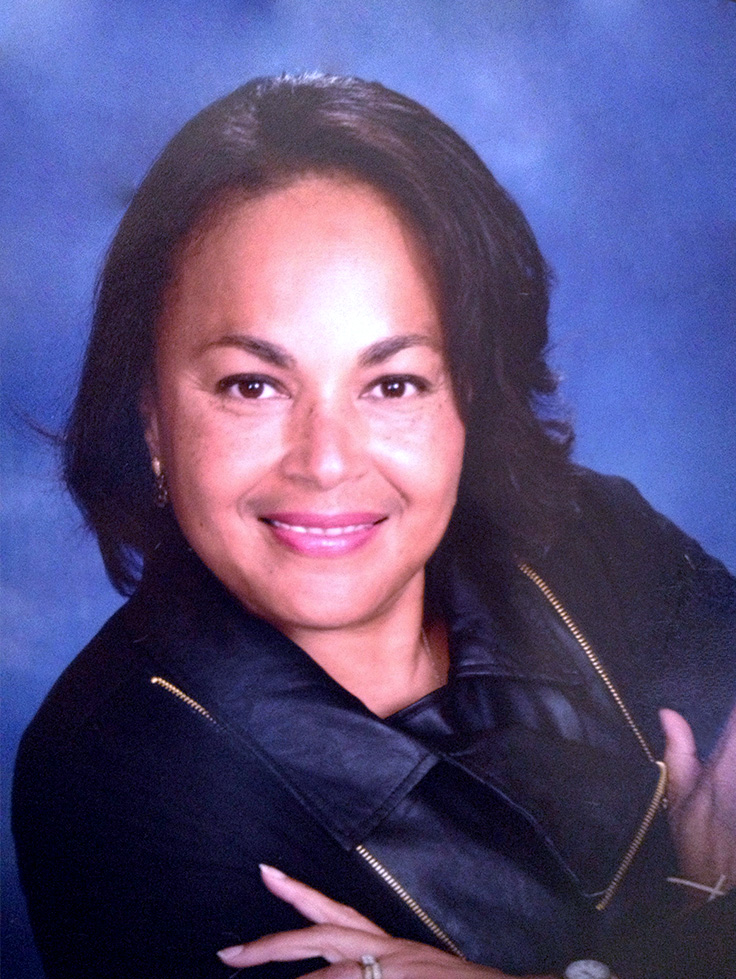
What did you hear about Hartford Seminary before attending?
Hartford seminary is outstanding and committed to theological academics and multicultural programs. In 1889, Hartford Seminary became the first seminary to admit female students.
What made you decide to attend?
This program helps to build, prepare, and train leaders. This program was filled with the presence of the Holy Spirit! I knew upon my completion of BMP that I would be back to Hartford Seminary for my graduate degree. It was through BMP that I was introduced to the writings of Cornel West, who taught me “ the problem is we need much more moral content.”
What degree program did you graduate from?
I started my journey in the Women’s Leadership Institute. It was in WLI that I learned how to apply our spirituality. In WLI I was blessed to work with Professor M.T. Winter in the Christmas Toy Ministry “ Where Love Is” for the past two years. I also graduated from the Black Ministries Program as the class president in 2008, and just received my Master of Arts in Transformative Leadership and Spirituality in 2016.
What sets the Hartford Seminary environment apart?
What sets Hartford Seminary apart? The transforming work of the Holy Spirit in our lives, mind and heart which conforms us to the character of Jesus. To sum it up in one word “Ethos.”
How do you plan on using your degree?
I am using my leadership skills as the founder of “The Anita, Ava House For Women, Inc.” and in the Bloomfield Public schools where I work in Special Education. I am currently working to start a mentoring program there for girls. I am also using my leadership skills in my church with a ministry called “Feeding The Multitude” for the hungry. Additionally, I am a hospice volunteer through Masonic Care as I witness people transitioning. It was in my class “The Essential Writings Of Howard Thurman and Religion In A Multicultural World” that I learned to be present in one’s presence. This has had a profound effect in my ministries.
What should prospective students know about Hartford Seminary?
There is one word that comes to my mind. They should expect “ Elevation.” Proverbs 3:5-5 NIV, Trust in the Lord with all your hearts, and do not lean on your own.
The Rev. Dee Wellington Bright Sr. – Doctor of Ministry
“The opportunity to study with Jews and Muslims broadens your scope of study. It adds to the uniqueness of this place.”
– Rev. Dee Wellington Bright Sr.
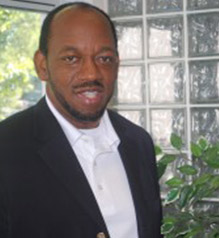
What did you hear about Hartford Seminary before attending?
I’m an immigrant from Liberia, where I served as an Episcopal priest for 10 years. I came to the U.S. [in 1996] and experienced many cultural shocks, including that mainline congregations were declining. That was surprising to me coming from Africa. … I took an interest in studying the dynamics of U.S. congregations. I started at Yale Divinity, but if you really are interested in U.S. congregations, you have to look at Hartford Seminary.
What degree program did you graduate from?
The Doctor of Ministry. I was the rector of a parish in Springfield, MA, and have since relocated to Oklahoma.
What sets the Hartford Seminary environment apart?
I was in one of the largest D.Min. classes. There were folks from other Christian denominations, other faith traditions as well. It was also interracial and intergenerational. The [seminary] did good work in recruiting that diversity. … [The Doctor of Ministry program is tailored] to what you are studying and what you are doing in ministry. I like the whole dynamic. It’s not something apart from your ministry. The professors are quite aware that the students are professionals in their field. There’s a balance of rigorous work and elastic tolerance to each person’s situation.
How do you plan on using your degree?
I was in search of a new ministry. When I sent in my application and resume (to the parish in Oklahoma), they were fascinated by my knowledge of congregational ministry. I credit that to this place.
What should prospective students know about Hartford Seminary?
No. 1, it’s very strong in congregational ministry. No. 2, it is practical theology, not just philosophical theology. No. 3, the interfaith component. The opportunity to study with Jews and Muslims broadens your scope of study. It adds to the uniqueness of this place.
Jennifer Sanborn – Master of Arts
“I truly feel like the Seminary is living its mission of preparing peacemakers.”
– Jennifer Sanborn
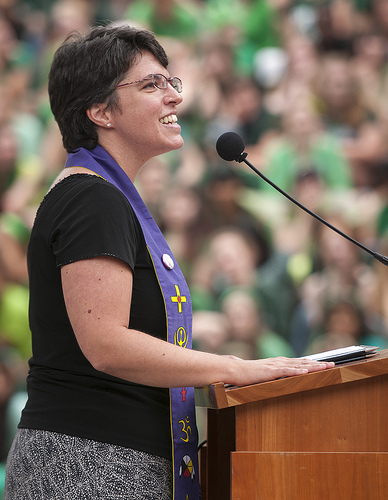
How did you hear about Hartford Seminary?
I am the daughter of an American Baptist pastor and granddaughter of two. Seminary has long had some intrigue, given the members of my family in ministry. I did not foresee serving as a traditional pastor, however, so my exploration of seminary was in aligning the education with my values, interests, and professional focus. The Women’s Leadership Institute was a perfect fit! I discovered the program online, and, in a “Spirit of God Moment,” soon thereafter accepted a position in the Hartford area that resulted in our family moving here from Massachusetts.
What made you decide to attend?
Following the Women’s Leadership Institute, I continued to take one course at a time, simply because I enjoyed my classmates and the interfaith learning environment. This one-at-a-time model first turned into a certificate in Ministry in Daily Life and then into a Master of Arts in Spirituality.
When did you graduate and what degree/certificate did you get?
I graduated in 2012 with a Master of Arts in Spirituality.
What sets the Hartford Seminary environment apart?
A number of seminaries are experimenting with serving students of multiple faiths. For me, Hartford Seminary is beyond the experimental stage–this quality of the educational experience is well-integrated and an assumed value for those who come. The faculty are more adept at engaging multiple faith perspectives, even in classes like Scripture and Theology, where primary belief systems can easily dominate. I truly feel like the Seminary is living its mission of preparing peacemakers.
What should prospective students know about Hartford Seminary?
Prepare to invest yourself. You can skate along the edges of the experience, but you will be missing out on the full richness of what is offered by the faculty, staff, and students of Hartford Seminary. I am grateful to count many classmates as personal friends and professional associates, and I remain in contact with faculty members as well!
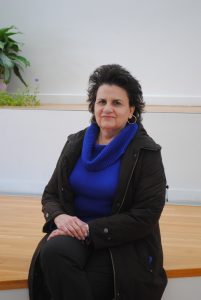
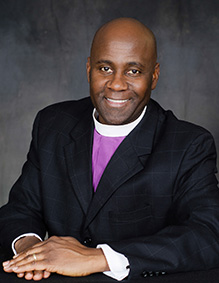
 Sign-up now ›
Sign-up now ›